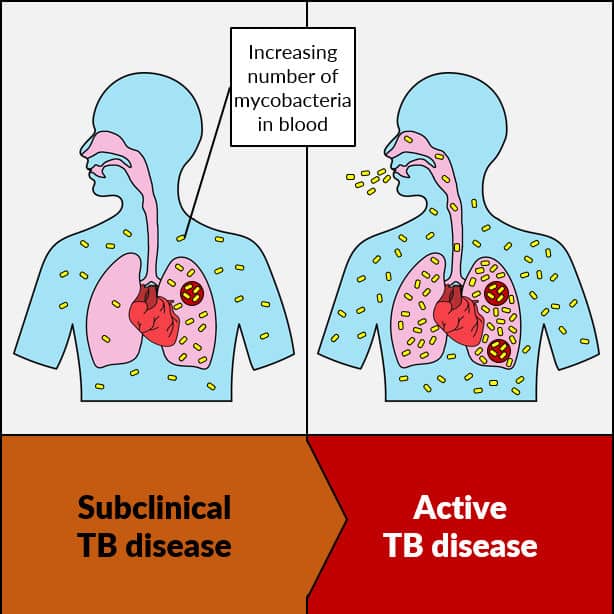The ‘Words Matter’ language guide from the Stop TB Partnership aims to create a consensus around the terms used to describe the dynamic continuum of TB infection and to de-stigmatise those impacted by the disease.
The field of TB diagnostics and therapeutics is evolving rapidly and insights gained from new technologies have revealed additional categories between the point of infection and active disease. This supports a greater understanding that not all those with a TB infection will progress to active TB disease, and also creates opportunity for closer targeting of preventative treatment.
This new knowledge has driven the need for clearer terminology and definitions.
One example of this is the need for a clear distinction in TB diagnosis, between antigen-based tests those based on rapid molecular assays. Antigen tests, such as IGRA, look at protein markers created by the host, this occurs in the later stages of the disease. Rapid molecular assays, such as PCR, look for genomic material specific to the mycobacteria and provide an early indication of pre-symptomatic disease.
The use of rapid molecular assays as the initial test to diagnose TB is recommended by WHO instead of sputum smear microscopy, because they have high diagnostic accuracy and will lead to major improvements in the early detection of TB and drug-resistant TB.
In the recent TAG Pipeline report Actiphage was the only non-sputum-based diagnostic in development that aimed to detect and quantify the number of viable bacilli in a patient sample. It is unique in that it uses a phage to extract the mycobacterial DNA, enabling rapid identification of the strain of mycobacteria from its bacterial signature using PCR.
The ability of Actiphage to distinguish between the patients at different stages of the disease continuum and indeed to confirm that treatment has been successful means that the ‘Words Matter’ language guide comes at a critical stage in the fight against TB..
The guide provides a very useful communication of the recently identified different disease stages, generating wider understanding of how new diagnostics, such as Actiphage, can support the global ambition to eliminate this preventable and curable disease – #EndTB.
GLOSSARY OF TB DISEASE STATES – WORDS MATTER
SCREENING
The identification of people in a predetermined target group who may have active TB disease using tests, examinations or other procedures that can be applied rapidly. This screening should efficiently distinguish persons with a high probability of having TB from those who are unlikely to have TB. Among those whose screening is positive, the diagnosis needs to be established by using one or several diagnostic tests and additional clinical assessments, which together have high accuracy.
Screening is an approach for active TB case-finding among people who may not seek care.
It should be distinguished from testing for TB infection (with a TB skin test or interferon-gamma release assay).
TB INFECTION
The presence of viable M. tuberculosis with or without progression to active TB disease, and none is expected unless there is serious immunologic compromise.
People infected with TB bacteria have a lifetime risk of progressing to active TB of approximately 10 per cent. However, those with compromised immune systems, such as people living with HIV, malnutrition or diabetes or who use tobacco have a much higher risk of becoming sick with active TB disease.
LATENT TB INFECTION
A state of persistent immune response to TB infection without evidence of progression to active TB disease.
INCIPIENT TB INFECTION
Infection with viable M. tuberculosis that is likely to progress to active disease in the absence of further intervention but has not yet induced clinical symptoms, radiographic abnormalities, or microbiologic evidence consistent with active TB disease
SUBCLINICAL TB DISEASE
The TB disease is at an initial stage, developing or beginning to happen.
Disease due to viable M. tuberculosis bacteria that do not cause clinical TB-related symptoms but cause other abnormalities that can be detected using existing radiologic or microbiologic assays.
ACTIVE TB DISEASE
Presence of M. tuberculosis that has progressed from infection to active disease; in other words, what is commonly meant when we say that “a person has TB”. While the most common and communicable form of TB involves the lungs, TB can affect other organ systems, bones and joints, the genitourinary tract and other sites.
ELIMINATED TB INFECTION
M. tuberculosis infection has either been cleared by innate and ⁄ or acquired immune responses or has been cured with anti-TB medications. An individual with eliminated TB infection no longer has viable M. tuberculosis but may still have immunological evidence of prior infection
PULMONARY TB
Active TB in the lungs, as compared to extra-pulmonary TB, where M. tuberculosis is present in organs other than the lung.
MILIARY TB
Used to describe a form of pulmonary TB with the appearance of millet seed-like lesions throughout the lungs. Miliary TB occurs when the bacilli get into the bloodstream and disperse to all parts of the body. This can cause disease in multiple sites of the body.
Words Matter – the importance of appropriate language for TB communications


